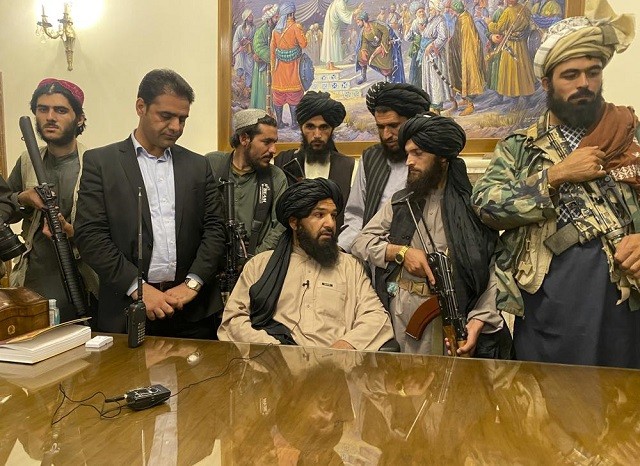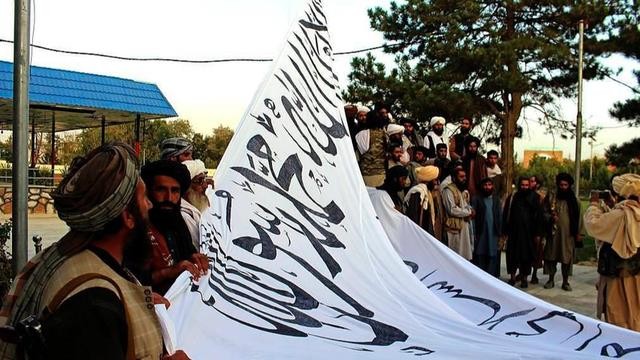(VOVWORLD) - After a series of quick developments, the Taliban on Sunday declared the war in Afghanistan over and has taken full control of the country. The Afghan President accepted defeat and fled the country. Nearly two decades after US-led forces toppled its regime, the Taliban has taken over the country again, opening a new page in Afghanistan.
 Taliban fighters at the Afghan Presidential palace on August 15 (photo: AP/ Zabi Karimi) Taliban fighters at the Afghan Presidential palace on August 15 (photo: AP/ Zabi Karimi) |
The spokesman for the Taliban’s political office, Mohammad Naeem, said the type and form of the new government in Afghanistan will be made clear soon. He affirmed that the Taliban has complete control of Afghanistan.
The Taliban return
The Taliban’s political spokesman made the announcement hours after its forces entered Kabul and seized control of all government institutions, including the Presidential palace. Before Kabul, the Taliban had already captured 33 of 34 provinces and cities. Its advance seemed to encounter little resistance from government troops.
Afghan President Ashraf Ghani officially accepted his government’s collapse on Monday. As soon as Taliban fighters began entering Kabul, Ghani left the country, saying he wanted to avoid further bloodshed. His destination is not known, but he criticized the Taliban for using force against the democratic process in Afghanistan.
The US and many other Western countries have confirmed the Taliban’s full control of Kabul and Afghanistan, but said they will not send troops to interfere.
The Taliban has taken control of Afghanistan with shocking rapidity, just three months after the US and its allies began withdrawing their combat forces.
 The Taliban waves their flag at the Presidential palace in Kabul on August 16. (photo: Reuters) The Taliban waves their flag at the Presidential palace in Kabul on August 16. (photo: Reuters) |
Unpredictable future
Taliban spokesman Naeem said the Taliban have obtained what they were seeking – the freedom of their country and the independence of their people.
He said the Taliban will ensure safety for all citizens and diplomatic missions and is ready to have a dialogue with all Afghan leaders to resolve bilateral and regional relations. The new government will include non-Taliban figures and the group will respect women's and minorities' rights and freedom of expression within Sharia law, Naeem said.
His statement suggests that the Taliban is somewhat different than it was 20 years ago. US and EU analysts say there is nothing to guarantee the future of Afghanistan and the Afghan people under the Taliban for the following reasons: The Taliban’s power is based on violent activities. It’s not a civil organization suitable for running a country. And after many years of war, Afghanistan is suffering from financial exhaustion and socio-political-security instability.
The Taliban is promising to respect women’s rights and freedom of expression, but Sharia Law, which it enforced with a strict interpretation in the past, suppresses those rights.
Another concern is that the Taliban has close relations with many terrorist and extremist groups, including Al Qaeda and ISIS. The Taliban’s current victory is due in part to the help of terrorist and extremist organizations with which it may want to maintain connections during its regime.
Some people are suggesting that, under international pressure and considering recent developments, the Taliban may be ready to change its style. But how the Afghan people will fare and how they will rebuild their country under a new Taliban regime are questions that are waiting to be answered.